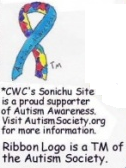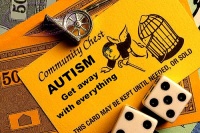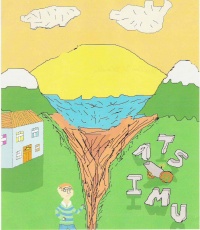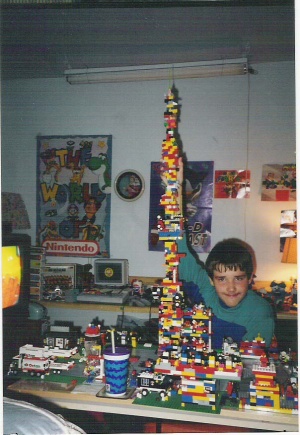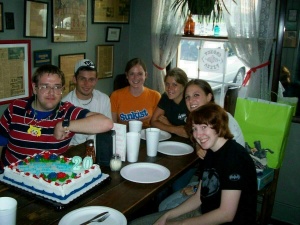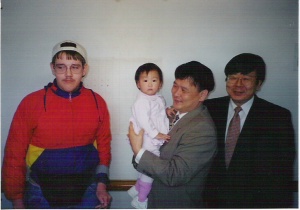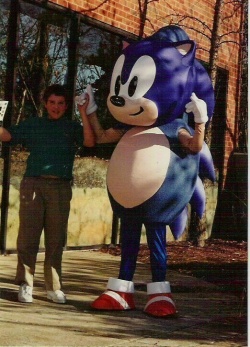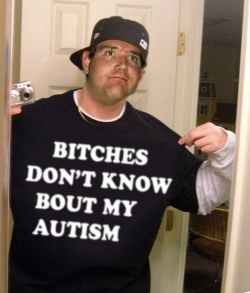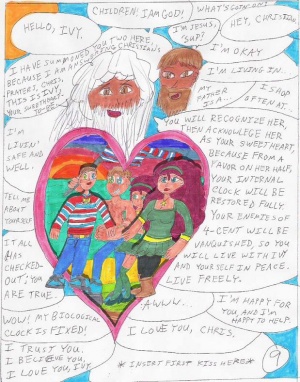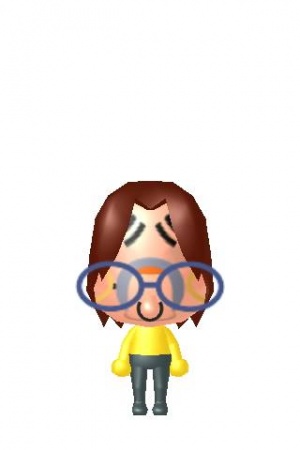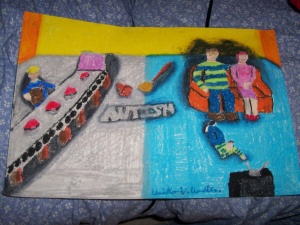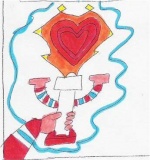Autism
- For the song, see A-U-T-I-S-M.
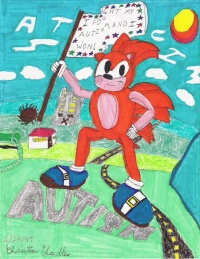
Autism is the lens through which Chris experiences the world. It is impossible to understand Chris's defensiveness, hypersensitivity, narcissism, irresponsibility, paranoia, victimhood, self-pity, and poor grasp on reality without understanding his relationship with autism. Chris was diagnosed with the disorder in his early childhood, and it became a cornerstone of his identity and influence on how he would act, alongside potentially other undiagnosed psychological or neurological disorders.
Overview
Autism is a neurodevelopmental disorder characterized by difficulty in communication and social interactions: issues that usually surface in childhood and carry on throughout life if not treated early on. The disorder represents a spectrum of different symptoms, behaviors, intellects, and support needs. Autism can also lead to restrictive and repetitive behaviors, intense passions known as special interests, and unusual fixations or approaches to stimulation. No two people with autism are exactly the same, and many common autism traits can even contradict each other (i.e. no eye contact vs. intense eye contact).
Autism is traditionally associated with either intellectual disability or above-average intelligence (or both in the case of savants), but most autistic people carry average intelligence. The autism spectrum historically covered a number of related diagnoses, including Asperger's syndrome, which Chris resents. The DSM-5 replaced these diagnoses with a single diagnosis of autism spectrum disorder, divided into three levels based on support needs.
Due to his status as an internet celebrity and lolcow, it goes without saying that Chris has a very unusual case of autism. Since he is arguably the most documented autistic person in modern history, he affects public perceptions of the disorder on the internet. That being said, it is highly likely that Chris has many other issues beyond just having autism, since Chris has demonstrated problems that can't simply be explained away by the disorder. (For instance, it shouldn't have taken him six or seven years to learn how to speak, even with severe symptoms. Meanwhile, his severe delusions that spiraled later in life demonstrate signs of a schizoaffective disorder.) Without a proper medical diagnosis, in part thanks to Chris's history of avoiding cooperation with people trying to help him understand himself on that level, autism remains the typical scapegoat to explain Chris's behavior, even if the truth may be more complicated.
Chris has built much of his identity around his high-functioning autism. His terror of being associated with severely autistic people causes him to be overly eager to prove his basic competence and cite his success in primary and secondary education. At the same time, his pride from accomplishing these things in spite of his disability has conditioned him to demand outrageous praise for his slightest efforts and infinite patience for his gravest errors. Moreover, Chris's belief that the entire Greene County Board of Education continues to irrationally persecute him for his autism has left him suspicious of opposing points of view and resolute that anti-autistic prejudice is the reason for any of his setbacks. The angst he has over his unsatisfactory graduation is made manifest in his webcomic as one of the work's key villains.
Chris not only seems to think that having autism imbues him with a special significance, but also feels that his autism is completely different from that of literally every other person in the world who has autism (which, while not totally wrong, is a gross oversimplification of the disorder's spectral nature). Chris feels he is naturally better than everyone else and often talks down to people who display knowledge or experience of subjects he is unfamiliar with. During his conversation with Kacey's father, Chris downplayed Kacey's knowledge of biology and healthcare despite being proven wrong mere minutes before in a debate over the genetics of autism.[1] At the same time, Chris believes he is not responsible for the majority of his mistakes. By being autistic, Chris rationalizes that it is wholly the fault of autism if he makes poor decisions.[2]
Chris's symptoms

|
PROTIP:
Do not use Chris to bash all autistic people, and do not complain about how he gives autism a bad name. He is one person on the autism spectrum. This article mostly deals with Chris's autism.
|
A 2004 psychiatric evaluation confirms that Chris has autistic disorder. Though his original childhood diagnosis papers are presumably lost forever, Chris was diagnosed by actual specialists, not armchair psychologists.
Nevertheless, many trolls dispute the exact diagnosis of Chris's mental condition, on the basis that his observed behavior is inconsistent with that of various other autistics. CWC-related forums (and other forums, for that matter) have seen numerous testimonials about people who are undeniably autistic but nowhere near as fucked up as Chris has turned out to be, and in general, these forums do not consider Chris to be an example of what most autistics are like. They are well-aware that the condition is a spectrum.
Quite often, autistics are indeed able to learn social skills to a certain extent in the context of intellectual learning. Others can learn social skills the old-fashioned way, usually through joining a group and coming out of their shell. Some can even come off as being completely neurotypical because they have come to realize that they must adapt to others' expectations of what's acceptable if they wish to succeed in life. They may also adopt the alternative approach of "Haters Gonna Hate," surrounding themselves with like-minded people and not giving a fuck about the bullies.
Chris, however, demonstrates a willful ignorance of normalcy, with a sense of entitlement coupled with an expectation that others should not only understand his ridiculous idiosyncrasies, but also accept them at face value. Sometimes, he even wishes to force them upon others.
A layman might come to the conclusion that Chris is not autistic, and he's just a regular, albeit quite idiotic, guy with a few "eccentricities" and personality flaws, or jump to the other extreme and conclude that Chris is completely mentally retarded or full-blown schizophrenic. Some folks argue that Chris's autism is so mild that it's barely relevant, while others attribute his entire personality to it.
But the truth appears to be in the middle: Chris's characteristics are most likely a combination of genuine autism, bad parenting, isolation, and other mental impairments.
His symptoms are listed below, coded to match the official DSM-5 diagnosis:
A: Deficits in communication and social interaction
1: Social-emotional reciprocity
Chris struggles with social-emotional reciprocity, the two-way understanding required for successful social interaction.
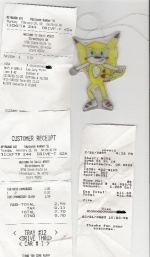
Understanding others' intentions
Chris has difficulty gauging others' thoughts, feelings, ideas, and intentions. He doesn't always understand that these might be different than his own, or how to predict these behaviors. In an email between Clyde Cash and him, he sent Clyde a link to a video he made of himself destroying his PS3. He destroyed his PS3 under the egregiously mistaken impression that he'd be given $9,001 for it, which is in itself an indicator of his fundamental inability to gauge others' actual intents and future behavior. He filmed himself doing it specifically to prove to Clyde, who wasn't present for the destruction, that it happened according to the video's objective portrayal. However, he added that if Clyde showed the video to anyone Chris didn't mean to see it without paying him the money, "it can be considered [Clyde's] Word Alone, possible Movie Editing and Actors, and NOT Fact" as though the video would have any less evidential weight on others if he denied to them what he rightfully claimed to Clyde that it showed with enough certitude that he would give him thousands of dollars because of its being shown.
Chris places disproportional importance on literal statements. Chris acted as though he could convince others of a fact contrary to videographic evidence simply by stating it. Another example is virtually the entire Liquid Saga, where Chris honestly, fervently, pathetically tried to demonstrate what was already blatantly obvious to everyone: that his name is not Ian Brandon Anderson and that Liquid was not him. He seemed to believe strongly enough to become visibly frustrated that others might believe Liquid's statements in the face of the obvious that he had to continually counteract those statements with his own as though just the statements were the most important or most effective means of proving what everyone already knew.
Chris is extremely gullible. While autistics can have problems with social cues such as sarcasm, thus being gullible at times, Chris is much more gullible than other autistics, let alone ones that are high-functioning. This is more due to his inexperience. One need only see his extensive list of sweethearts to see just how easily fooled he is. In addition, not only has he been fooled by trolls (of both sexes) pretending to be female sweethearts, he has fallen for trolls pretending to be Shigeru Miyamoto and approached him about making a Sonichu game. A telling statement comes from the aforementioned email to Clyde: "even if you upload the video yourself, it can be considered YOUR Word Alone[.]" (emphasis added) Chris might operate on the assumption that if a thing can be true, it's always reasonable to behave as though it is true no matter how slight the chance and no matter how much more likely it is to be false.
Empathy and sympathy
Chris shows very little empathy and concern for others. In his plea to Clyde, his advice after the suicide of Clyde's brother Ryan Cash was "find yourself a girlfriend." He asks for ED to please understand him, because he is an "innocent victim of misunderstanding"—he wants empathy from others, but he can't return the favor. Chris primarily sees other people in terms of what they can provide for him; when accused of overstepping his bounds or other wrongdoing, he has no concept of remorse or apology except as something he must do to continue receiving favors. When forced to apologize, he makes insincere apologies followed immediately by further demands.
When Chris does attempt empathy, it's only when he already sees himself in the person, no matter how big the stretch is. This habit shows up in Chris's justifications for his votes. He voted for Obama because he was a victim of discrimination – equating Obama's struggle with racism to his own struggle with autistic persecution. He mainly voted for Hillary Clinton because she was a woman – which Chris has identified as since 2014. He never looked at either candidate's platforms or voted based on actual issues, just based on who he can "see" himself in.
Social awareness and boundaries
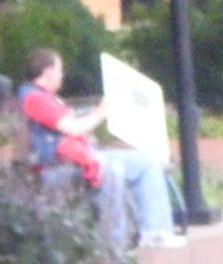
Chris struggles with social approach. He believed that holding up a literal sign with his requirements for an eligible sweetheart was a socially acceptable way to meet people. He would pace around public places aimlessly, and he has difficulty initiating conversations. He sometimes starts off the convo with botched attempts at pickup lines, and random-access humor. Nowadays, much of his social approach takes the form of meet-and-greet photo ops at conventions, though he still screws it up.
Chris doesn't understand the concept of boundaries, whether physical or verbal. He kissed people he met seconds ago at TooManyGames. He was quite handsy with Megan and Emily, and he buried his face in Catherine's breasts. He regularly refers to his superiors by their first name, sometimes even by pet names they don't even use. He doesn't seem to understand that different relationships call for different sets of social norms.
Chris lacks a conversational filter. He calls this honesty; normal people call it social dysfunction. Without provocation, he will tell you about his pinkeye, his DIRTY, CRAPPED BRIEFS, his autism itself, and how he is a virgin with rage. Only when his mother told him to knock it off did he actually give up telling everyone he was a virgin.[3] He mostly takes interest in himself while talking, only occasionally taking interest in his conversational partner.
All of the above could be explained by Chris's lack of social awareness. One notable instance of this, as revealed in the autism papers, was when two black ladies were speaking to Chris about his love quest, when Chris politely told them that they could not be his girlfriend because they were not white. Based on the report of the examiner, Chris believed he was merely informing the ladies as to his prerequisites for a potential sweetheart while oblivious to the fact he was being racially insensitive.[4]
2: Nonverbal communication
Chris can't show emotions well with facial expressions and body language. See his statement to the women of the world if you enjoy Chris appearing in your dreams. His inability to display emotions on his face has been called a "dead fish expression" (though Barb displays a similar stare). When he does attempt to have an expression, it looks very cartoonish, possibly because he copied it from actual cartoons. Also, notice his inconsistent eye contact in his Sonic the Hedgehog Watch & Win Sweepstakes news interview. He typically speaks in a monotone, and his attempts to sound expressive (see CWC's Message for Ivy) come off as creepy and unnatural. His incompetency with emotional display extends to his art and comics as well. He has a hard time displaying emotion on his characters' faces, and has even added emoticons :) to the speech bubbles to make up for his lack of ability to communicate through his art and writing alone.
Chris also has very poor facial and vocal recognition skills. Julie was a 13-year-old boy using an obvious falsetto and Chris fell for it. In one chat, the boy made no attempt to disguise his voice and Chris was none the wiser, disclosing personal sexual details. Two images of different people were used to represent Blanca Weiss, and Chris didn't notice. In an AIM Chat with Vanessa Hudgens, she sent him a link to pictures of Megan Fox, and Chris complimented her on them, even though the two don't even have the same skin colour. He didn't realize that Emily and Kim were the same person, even though their voices and laughs were obviously identical. Chris is inconsistent with his self-portraits and drawings of other people, relying more on color schemes and cosmetics (hair, clothing choices, etc.) than on facial features to distinguish them apart.
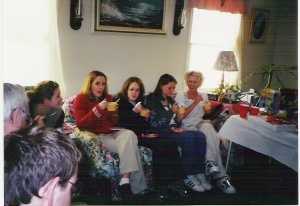
3: Interpersonal relationships
Chris's social dysfunction has caused him trouble with developing and maintaining relationships – platonic or romantic. Many non-autistics have the same problem, but Chris is particularly inept at socializing.
Chris's earliest friend, Sarah Hammer, was more of a bully than a friend; she locked him in the crawlspace of her house. His high school Gal-Pals were "hired help": Bob and the principal arranged a deal where they were paid to hang out with Chris. He rarely hung out with them outside school hours, except on his 18th birthday and at prom.
Chris has had very few friends as an adult. He loses friends regularly, manages to get banned from his favorite hangouts, and has no contact with any of his beloved high school Gal-Pals. He did have a circle of adult friends who played Pokémon with him, but he lost contact with them once he switched his focus to imaginary friends.
Despite this, Chris's social life was robust in comparison with his love life. Chris is in his late thirties, and he hasn't had a serious romantic relationship or any consensual contact with the opposite sex (aside from a prostitute), or same sex for that matter. His foray into online dating was a failure, and every one of his sweethearts was either just a friend or a troll. He viewed his desperate search as a Love Quest – a saga that began on his 21st birthday, and only ended when he got into a polyamorous marriage with his OCs.
Chris is also estranged from his family outside his parents. Chris's half-brother Cole Smithey has blocked him on social media. He has little contact with his other half brother David, and knows even less of his half-sister Carol.
As with many autistics, Chris does manage to have good relationships with animals, whether real or fake. Animals are more direct and don't have as complex of social rituals as humans. Animals also serve as a "social lubricant" for people on the spectrum. Anyone who knows anything about Temple Grandin can back this up.
B: Chris's restricted and repetitive behaviors
To receive an autism diagnosis, the DSM-5 requires restricted and repetitive behaviors in at least two of the following four categories. Chris meets all of them; examples are given below:
1: Movements and speech
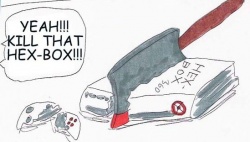
Chris often exhibits echolalia, which means he constantly repeats phrases from his favorite television shows, movies and video games, regardless of whether they fit the current situation. In some instances, he calls this "humor". He tends to use solipsistic neologisms; that is, he creates new words that only he himself understands and expects other people to comprehend them. He uses the same terms and exact phrases frequently. Many articles on this very wiki have been written to explain the resulting CWC-isms.
Autism is also linked to speech impediments. Chris has trouble with articulation, and often slurs words together like "Essaikapeeia Dramakka Payzh" and "Krishnwessonchanler". He frequently stutters, clutters his words, and speaks in a higher-pitched register.
Chris's unusual mannerisms are another sign. He rocks back and forth (dubbed "The Autistic Shuffle"), especially when stressed. He uses the same gestures repeatedly, such as his stress sigh, The Claw of Fail, and the infamous Dramatic Glasses Removal. He feels the need to refer to people by their full names, plainly visible when he talks about himself, Clyde Cash, or Adam Stackhouse.
An overlooked but crucial characteristic affecting all of Chris's physical activity is his display of hypotonia, which refers to a distinct lack of muscle tone — in biological terms referring to tension rather than the colloquial use to describe muscle strength (although raw physical strength is also affected by it) — which affects motor skills as well as stamina. Chris is not only very clumsy, he shows abnormally low muscle strength and gets tired quickly even by simply shuffling around for a couple of minutes — which cannot be entirely explained by his lack of physical exercise. Whenever Chris is shown sitting, he is spread around like a rag doll, hanging limply—as his muscles cannot support his entire body properly.
2: Insistence on sameness
One of the biggest symptoms of autism Chris displays is his fear and resistance to change, well beyond the point that it could be even related to his autism. Chris is reluctant to get or even look for a job as he has only worked four months in his entire life, has never come close to moving out, has a very hard time selling or giving up his toys or shirts, wouldn't stick to a diet and exercise program, doesn't try new ways to attract women, and has a very hard time coping with his banishment from the GAMe PLACe—where he would usually spend his Fridays. This might be resistance to change of his old lifestyle of just going to school and coming home and playing video games; his proven tendencies to avoid responsibilities and self-improvement show that he is trying to remain a child or simply fears failure of all types.
Chris thinks in absolutes and in terms of clearly defined steps in order to do something. He thinks there must be sex on or by the third date. He describes his sadness in terms of his heart level and briefly mentioned a Scale of Respect. He feels that if he just knows the correct steps to getting a sweetheart, he will be able to find one easily. His crash-course in dating and suggestions to Blanca assume that a relationship should follow a rigidly predetermined progression instead of a natural flow. In an exchange of e-mails with Jackie, Chris responded to her frank descriptions of his habits and lifestyle by saying she had exceeded the "Hurtful Truth Level"; while he knows he should be appreciative of hearing the truth about himself, this was the only way he could wrap his brain around the abstract idea enough to be able to tell her he thought she'd gone too far.
Some autistic people follow rules so strictly that it's bordering OCD. Chris however, has the opposite problem. He lives in a filthy, unorganized house, makes comics with a very inconsistent plot, wears the same shirt for days at a time, and disobeys the law when it inconveniences him.
3: Fixations and special interests
Chris has an extremely narrow range of interests. He seems to only give a damn about video games, cartoons, prowling for his next sweetheart, his initials, and Sonichu, so much to the point where he practically places him somewhere in everything he creates. He often wishes to combine two interests.
Unnatural relationships with inanimate objects are also a sign of autism; Chris has evident obsessions with his medallion, his PlayStation 3, and any number of other items that clutter up his room. Since autistics have difficulty maintaining relationships with people, they often end up becoming emotionally dependent on objects, though this symptom is seen much more in autistic children.
Although he does not demonstrate any competency with them, Chris has a fixation on numbers and statistics that would generally be irrelevant to others. He describes measures in concrete terms (e.g. "5 mies[sic] from the city"[5] instead of "outside the city"), and has a particular obsession with times and dates, timestamping nearly every scene in the comic and giving his characters birthdays and middle names that have no relevance to the plot (unless it becomes convenient to "age up" the characters). Needless to say, Chris's tendency to blurt out exact dates and times (assuming he's not talking out of his ass) has made the job of CWCki chronologists much easier. On the other hand, his haphazard treatment of dates and times in the comic has led to countless continuity errors.
Chris's fixations also manifest as brand loyalty. Chris has been loyal to Nintendo, Sega and Sony, to the exclusion of Microsoft. He's loyal to McDonald's and dislikes Burger King. He felt that Harry Potter was a threat to Pokemon. His brand loyalty went beyond simple preferences and extended to actual obsessions and hatreds. He'd hype up Axe and Walmart in videos. He'd blindly trust advertisements and even include ads of his own in his comics.
Chris's transgender identity is yet another fixation. According to psychologist Ken Zucker, trans folks are more likely to be autistic than the general population. The link is caused by, among other traits, autistics' tendency to fixate on issues (in this case, gender). Many autistic males (including Chris) also have qualities that can be considered "girly", such as passiveness. Since they have less social awareness, they may behave in ways that can be considered atypical for either sex and display less regard for gender roles. Chris and many other autistics perceive their quirks as being "female in a male body" or vice versa, and assume that they will fit in better as their desired sex.
His fixation showed itself strongly when Sega changed Sonic's arms from tan to blue. Chris launched a crusade that ended with him macing an innocent GameStop employee; a criminal offense launched entirely by a minor change to a fictional character who happens to be Chris's icon.
4: Sensory processing
Autism affects how the brain interprets the senses. Chris is often either hypo- or hypersensitive to sensory stimulation. Chris often wears his accessories and medallions over top his clothing to avoid skin contact with metals and plastics. This is evident in the way in which Chris wears his watch over the cuff of his sleeve and wraps his medallion through the collar of his shirt.[6] Most obvious however is his wrist warmer which he places on the chain of his medallion. Chris has stated that "[...] it is a part of my necklace; it's a "Wilson" wrist-warmer I use to cover the discomfort of the number of Links back there."[7] Loud sounds also bother Chris. He was prohibited from attending pep rallies in high school,[8] and has expressed hesitation about visiting bars because of the noise.
Sensory dysfunction isn't limited to the five external senses – it extends to internal, "hidden senses" such as balance, body position, hunger, thirst, time, gag reflex, and internal body pressure (such as when one has to use the facilities).
Severity of Chris's autism
| “ | He may be high functioning (which I actually doubt -- who would want to admit to thousands of strangers that they are actually severely challenged??), but that does not mean he can function like a non-mentally challenged person. | ” |
| rae12, Cracked.com[9] | ||
Informally, autism may be subdivided into separate classifications based on the intelligence and degree of function the autistic individual possesses; for a general idea, this crude scale could have levels of high-functioning, medium-functioning, and low-functioning. Chris has latched onto this concept and will frequently qualify his condition, saying he has high-functioning autism, or HFA. Generally, HFA is loosely defined as; the ability to live in the mainstream world as opposed to being institutionalized, having near-normal comprehension, demonstrating fluent speech, and possessing average or above-average intellect. This presents Christian with an easy scapegoat and alibi: he cannot be blamed for his own failures because he has autism, but he does not accept treatment or advice for his "medium" or "low" level autistic traits because he's high-functioning and therefore, nearly normal.
Trolls have often noted that the "high-functioning" qualifier is not a clinical diagnosis and is not recognized by the DSM-IV-TR or the ICD-10. This usually goes hand-in-hand with questioning the severity and/or diagnosis of Chris's impairment, if not outright calling him a liar. However, the Chandlers didn't make the "HFA" label up, and compared to kids who can barely speak and just walk in circles all day, Chris is relatively close to neurotypical. Semantics aside, though, it's clear that Chris is far from normally-functioning. Only an updated psychological profile would really provide insight into the complex and controversial mixture of autism and mental illness that is present within Christian.
The newer DSM-5 does distinguish different levels of severity based on the amount of support needed, but the new term is "Autism Spectrum Disorder Level 1", not "High-Functioning Autism". Additionally, the autism community detests functioning labels since they oversimplify the spectrum as a one-dimensional scale. When describing whether or not someone can speak, the community prefers "verbal" and "nonverbal" instead of "high/low functioning."
Disgustingly, but perhaps not surprisingly, Chris detests low-functioning autistics in the exact manner that he fears normal people will detest him. In Mailbag 25, he compares those with low-functioning autism with those who suffer from severe retardation or severe brain damage, thinking that they would have their arms linked together, have deformations, be confined to wheelchairs or crutches and drool and grunt and growl. He has also described them with extremely cruel and derisive terms, calling them "WINDOWS TO HELL" and compared them to "zombies".[10][11][12] The irony of his resentment toward "low-functioning" autistic people is that he has a severely autistic cousin, as revealed in the autism papers; this probably means that either Chris is not aware of his own relatives (very probable), or he has disowned members of his own family on the basis of them having the same medical condition that he has (albeit more severely affected by it), being the autism-Nazi he is.[13]
He explains that he refuses to date a girl with any form of autism because he fears that seeing them will make him think about what he might be like if he had anything other than high-functioning autism.[14] Chris believes he can do much more than any low-functioning autistic could, even as he's living with his mother well into his thirties, has never had a real girlfriend or held a steady job, and soils his pants on a semi-regular basis.[15]
Still, presuming Chris is autistic, he is high-functioning since he can talk, drive, write and draw, even if he's not the best at these things. However, this also means that he has the same medical condition as Elon Musk, Temple Grandin, and Satoshi Tajiri, amongst many others, yet he has failed to do anything significant with his adult life – hence proving that his vulgarity and failure are, for the most part (this is further elaborated on below), his own fault.
Onset and diagnosis of Chris's autism
| “ | No one GIVES A SHIT that you are autistic, they NEVER DID. | ” |
| Jackie, telling Chris something he'll flat out ignore. | ||
Chris's version of how he developed autism is best explained in the Song of Christian video. There he explains how a babysitter locked him in a room filled with toys at around age 1 1/2. After crying for hours, he emerged from the room unable to talk; as Chris himself puts it, "God put the mute button on me".[16] (This implies that Chris could talk before this incident, which directly contradicts Chris's own parents stating that he never spoke until around the age of seven.) Most specialists claim that these symptoms of autism begin to show around that age anyway,[17] so even if the events of the story happened, the babysitter didn't cause the autism. It is far more likely that Chris's parents simply looked for anyone to blame for Chris's sudden loss of language development, even a random babysitter. Notably, Chris has diverged from this story before, having claimed at least once that he was intentionally "injected" with autism by doctors when he was a child as if that were even possible. Nevertheless, it speaks volumes on the veracity of the former account if he can't even keep his story straight, not to mention that Chris probably has little idea on the causes of autism anyway.
As for how Chris actually became autistic, studies have shown that there is a positive correlation between the age of the mother and the risk of autism. Given that Barb was 40 years old when she gave birth to Chris, this is a likely explanation.
It is also worth noting that Bob was an engineer, and studies have found higher autism rates among children of engineers (and other technical occupations).[18] Bob's granddaughter Savannah is also autistic.
It is currently unclear how Chris came to be considered as "autistic", although Chris has claimed that his parents possess official documentation about this in a safe. When pressed to release this information, he provided a 2004 psychiatric evaluation that states Chris was diagnosed with autism when he was "around age five or six". However, there's no way to be sure if the evaluator simply wrote down Chris's responses to his questions or independently verified them. (For example, Chris might not remember his exact age when he was diagnosed, but you'd think his medical records could be more precise than "five or six".) By the time of the Chandlers' legal battle with Greene County, Chris's autism seemed to have become a universally accepted fact, but the details of how, when, and where Chris was diagnosed remain a mystery.
When recounting his childhood, Chris usually skips straight from the "evil babysitter" incident to age seven, so we know very little about what (if any) treatment he received during this crucial period of development. In a CWCipedia mailbag, Chris claims that when he was young, his parents were told he would never be able to read, write or function on a normal level. He and his doctors have now upgraded his condition to "high-functioning", but apparently his incredibly abysmal upbringing has actually allowed it to progress to mid-functioning at best.
In his "Song of Christian" video, he explains that his mother took him to the toy department and coaxed him to read aloud the names of Go-Bots, and later Transformers. Chris says he began speaking again when he was seven – that is, in 1989, when the Transformers line was on its last legs and the Go-Bots line had long since vanished. This would seem to indicate that this form of "therapy" had to have gone on for several years before producing any results.
Persecution
Chris attended Greene County Primary School, apparently without incident, from age 5 until age 9. Problems arose for him in the fourth grade at Nathanael Greene Elementary School, where he alleges that the faculty wanted to remove him from mainstream classrooms and send him to what he calls an institution. He also claims that the teachers at the school held him down and recorded his screams. Chris frequently cites this as evidence that the school was senselessly cruel towards him, for no reason apparent to him except an innate fear and distrust of autistic people. More probable, given Chris's ongoing behavioral issues, is that he threw a temper tantrum so big it forced the faculty to physically restrain him while refusing to restrain himself. There's no way to know if Greene Elementary treated Chris unfairly, but the incident does suspiciously resemble Chris's arrest in July 2005. The Chandlers sued to prevent the school board from removing Chris from mainstream education before ultimately relocating to Chesterfield County to continue Chris's mainstreaming there.
Chris frequently brings up that the reason people used to be cruel to him in his childhood was because "they did not understand Autism". In the 1980s. When autism had been known for around 40 years. When asked about why they did not understand, Chris delivers his canned response of "I do not know".
There's no way to know how much of Chris's attitude about the Greene County crisis is based on his personal recollections or what he was later told by his parents, who themselves seem unusually paranoid about the county's vendetta against their family. However, the result of the incident is clear: Chris emerged from adolescence firmly believing that many people not only misunderstand autistic people but hate and fear them. He seems to believe this prejudice is based not on a person's actions (e.g. throwing fits and irrationally screaming) but on a person's mere identification as autistic, regardless of function. Given Chris's fear of low-functioning autistics, he may in fact think this prejudice is perfectly justified, but wrongfully targeted at a high-functioning individual. Of course, in Chris's mind, he may as well be the only high-functioning autistic in the Universe, so he is the one and only innocent victim in "everyone's favorite game, Kick the Autistic".
Chris's tactful and sensitive comments on a news story about a woman with Asperger syndrome being raped revealed that he believes the media, like the rest of the world, has a bias against autism similar to "Missing White Woman Syndrome", and that the story wouldn't have been reported if the victim was a woman with "proper" autism.
Chris's misconceptions about autism
It's not clear that Chris has any understanding of what, precisely, autism is, except that a) he has it, b) it's a bad thing, and c) he's a brave little boy for living with it. His song "A-U-T-I-S-M" sums up his attitudes about the disorder:
| “ | A-U-T-I-S-M: what does it mean? Silence and friends unseen! A few brains as well: that is autism! And that makes us seem special to you! | ” |
| Chris, attempting to spell out autism in more ways than one | ||
To Chris, that's all it is — a condition that makes you a bit smarter than normal human beings and mysteriously makes people not want to be your friend.
Chris also seems to only be aware of the symptoms of autism that fit in with his odd, pseudo-Bohemian lifestyle. Asexuality is very common in autistic people; this is because any form of romance or sex may be too intimate for an autistic mind to cope with. This completely contradicts Chris's "Love Quest" and suggests that he is actually trying to compensate for his inability to feel true sexual attraction, even if that means becoming a genuinely disturbing pervert. His tone-deafness for singing is fairly unusual for an autistic individual as well – autistic people tend to have stronger pitch perception, and they are more likely to have perfect pitch than the general population.
Chris considers himself to have "Helped cultivate the First Generation of Autistic People", suggesting that he believes he is a prevalent figure in the autistic community..
In a May 2010 video, he stated that our society is spending so much time on the Internet that everyone is becoming autistic.[19][20] This further proves that people with little to no social contact shouldn't attempt social commentary. That, and Chris has no fucking clue what his own disorder is actually like. In November 2010, he tried to use this excuse to guilt trip Jackie into being sorry for yelling at him, which worked as well as you'd expect.[21]
Chris's failure to understand the symptoms of autism may well explain some of his odd behaviors. Due to lack of social activity and poor theory of mind, Chris doesn't seem to realize that his behaviors are what they are, as best demonstrated by his belief that it is normal for an adult to shit themselves. Chris does not recognize the differences between himself and others, and this applies to the differences between himself and neurotypicals - and, seeing no differences, he believes his autism to have been thoroughly conquered, even while embodying every single trait of it.
Chris on the causes of autism
There's a broad scientific consensus that autism largely arises from genetic factors. Chris's own case is consistent with the theory that children born to older parents are at greater risk of developing autism.[22] Bob and Barb were 54 and 40, respectively, when Chris was conceived.
Chris's own expressed views on the root causes of autism are all over the map. He's espoused a few different theories at different times and in different situations. His oldest theory, dating back to the Song of Christian in the late 1990s, is that the abusive babysitter was responsible for his condition. In his arguments with Clyde Cash in early 2009, he said that "scientifically speaking, [autism] has possibly come from a drug, or otherwise it may possibly be genetic", and that the babysitter incident merely "brought out the, uh, curse that was buried within me."
When explaining his condition to Matt Devoria late in the fall of 2009, Chris insisted that autism has no genetic factors. In that instance, however he had an obvious agenda. He hoped to convince Matt that any children he fathered with Matt's daughter Kacey wouldn't wind up inheriting his condition; because of this, it's difficult to say exactly how sincere he happened to be at that moment.
To muddle the issue even further, in Mailbag 12, Chris blamed the cause of autism on a shot "the doctor's [sic] optionally give to the child after birth", apparently in reference to the highly disputed urban myth alleging that childhood vaccinations lead to autism. It's not likely that Chris even has that much of an awareness of the facts and assertions of said myth, and was probably looking for a throwaway excuse to deny any hereditary factors.
In a video in 2010 Chris said the Internet made people autistic, likely confusing the hyperbolic claim often made jokingly to that effect with fact. Ironically Chris's excessive use of the Internet in place of human interaction has probably done more to exacerbate his symptoms than almost anything else.
In his Autism Tutorial from early 2011, Chris slewed back toward a more mainstream view, discussing the genetic factors behind autism and complaining about how his parents conceived him late in life. He also, however, warned viewers that smoking, drinking, or exposure to car exhaust could cause dangerous genetic damage that might result in autistic children.
Chris versus Asperger syndrome
Chris is easily outraged by any attempt to associate or confuse autism, high-functioning or otherwise, with Asperger syndrome, a similar condition now considered by many experts to overlap with HFA on the autistic spectrum. In fact, Asperger syndrome was eliminated and replaced with "autism spectrum disorder, level 1" in the new DSM-V, making both the condition and "high-functioning autism" one and the same.[23]) At times, Chris has stated that he dislikes Asperger syndrome because sufferers of the disorder supposedly steal sympathy away from autism awareness. He has also claimed that the name is too close to "ass burger" or "ass booger" for his taste. In the early days of the CWCipedia Mailbag, asking Chris about Asperger syndrome was the most effective way to troll him; this culminated in the creation of Asperchu.
In the present, Chris simply hates Asperger syndrome because it reminds him of how angry he got the last time someone brought it up — in other words, a completely unjustifiable opinion. Chris has declared himself "close-minded" on the subject, dismissing all scientific opinion contrary to his own, and angrily refuses to be convinced that he does not occupy a more favorable (exactly what that means depends on whether Chris is looking for pity or adulation at the time) tier of the spectrum.
Chris on Neurotypicality
Chris also has little understanding of the concept of neurotypicality, the state of lacking any kind of autistic traits. Some people on the autism spectrum, especially those with Aspergers, are deemed to be of above-average intelligence or possess a special talent in another field like music or art. Chris has taken that to mean that he himself must also be in that same group of autistics, where he is much smarter than the average person. This is especially prevalent during the Dimensional Merge era, where he refers to non-believers as "neurotypically hindered".
Chris on autism education
Chris is a firm believer in mainstream education for children with autism, a trait he doubtlessly picked up from his parents, who went to incredible lengths to keep him in mainstream classrooms throughout his school years. He had special education classes in addition to his mainstreaming - coping skills classes during both middle and high school.[24]
When asked for his advice on how to raise an autistic child, Chris replied "...Most Importantly, MAINSTREAM; let your child be free to communicate and associate with the Normal Society. Special Education is okay, but that will not do in the longest run." Later, for advice on how "to succeed despite being afflicted with Asperger's", Chris's only response was, "My advice is to Mainstream the child."
During a video from April 2010, Chris read off a lengthy printout of autism-related information. After quoting a passage about how the education of autistic children should be undertaken by trained professionals in specialized settings, Chris offered his own opinion.
| “ | As for me though, I highly recommend mainstreaming, lettin' 'em go though normal life. I mean yeah, give 'em the special treatment while they're young... but when you get 'em in elementary or middle school... or high school, mainstream is the way to go. | ” |
| Chris, Autism Awareness & Men Should NEVER be Topless | ||
In short, Chris believes that the approach that produced the man as we know him today (i.e. ignoring the problem and doing nothing to help it) is the best possible way to raise and educate children with autism.
Autism cured?
Chris's greatest dream is that his autism might one day be cured (although in 2006 he would have unhesitatingly sacrificed such a cure in order to obtain a PlayStation 3). There are instances of children inexplicably recovering from the symptoms, but there is no known cure for autism that can simply be applied to everyone like Chris's "homo vaccine." Imagine the surprise of the mental health community, then, when Chris revealed in March 2009 that he had overcome his autism once and for all:[25]
- Christopher C.W.C.: I'm not going to blame it on my autism; I have realized that I am over that now.
- Sarah May: Over what?
- Sarah May: Over your autism?
- Christopher C.W.C.: yes
- Sarah May: . . .
- Christopher C.W.C.: anyway, what is it that you want to do?
- Sarah May: Christian
- Sarah May: Are you serious?
- Sarah May: Autism is not influenza
- Sarah May: You don't 'get over it'
- Christopher C.W.C.: I've broken out of my autistic shell, and I am better able to socialize in public, with the past practices online.
Chris claimed during the same chat that he may not be making sense due to a virus, easily allowing for him to retract this. Fortunately, Chris has discovered that stress is a more socially popular scapegoat for his personal shortcomings. Of course, people learn to manage stress, but what do you expect?
As of May 2009, Chris seemed to have regained his autism and was back to blaming it for all his problems, seemingly believing that autism is as easy to shake/regain as the common flu. However, November 2009 saw Chris again claiming to have been miraculously cured, as stated at the end of part 2 of his Sonichu Powerpoint presentations, where he described himself as a "high-functioning autistic recovered". A month later, Chris again backpedaled; in response to ED's claim he was "suffering" from autism, he agreed that "I still am for real."
Chris's flip-flopping self-diagnosis simply illustrates his misunderstanding of his problems. Since autism is his scapegoat for when he fucks up, to him that's really all it is — a disease that makes people fuck up all the time. Therefore, when he fails, he has a bad case of autism, and when everything is going well (such as when he believes he has a girlfriend), he thinks the autism has gone away. What Chris really wants, then, is not a cure for autism but a life in which nothing happens that he would need to blame on his autism; that is, a life in which he has a girlfriend and nobody criticizes him.
In June of 2016, he claimed to have cured his autism using Subliminal Frequency Hypnosis. He stated that the track made him think clearer and interact better with others. However, he has shown no improvement in the quality of his recent videos, and he would continue to make autism-related content in the future.
Things Chris has not blamed on his autism
Chris and other autistics
Chris on other autistics

|
This article is out of date.
We suggest you keep up with the times.
|
Listening to Chris go on about "us TRUE and HONEST autistics," you might think he has some kind of misplaced sense of autistic solidarity. But this would merely be dumb, and Chris-chan always shoots for both dumb and repugnant, so the reality is that he doesn't give a shit about anyone's autism but his own. He calls lower-functioning autistics "windows into hell"[26] and regards them with exactly the same kind of fear and mistrust he bitches about people treating him with when in reality many much lower functioning autistics lead far more independent and fulfilling lives than he does. He has once expressed a disdain for others with high-functioning autism, with HFA being one of the characteristics excluding a woman from being a potential sweetheart. Meanwhile, he looks at people with Asperger Syndrome, who are on roughly the same part of the spectrum as him, as dirty whores trying to somehow steal the limelight from "real" autistics (ironically, many feel this way about Chris).
Chris has only once included another autistic person in his comics. In emails with Sarah Jackson, she told Chris that her sister was also a high-functioning autistic. When Sarah was included in Episode 19, so was her sister, Rita. When Rita was given dialogue after Sarah's death, what she said made so little sense grammatically (even by Chris's standards) that it is hard to see it as unintentional. It can, therefore, be speculated that Chris, thinking his own autism so much better than anyone else's, was attempting to make Rita seem as unintelligent as he assumes other autistics and people with mental disorders are.
His stance on autistic people would seem to shift a little in 2011, with him further believing himself to be a spokesperson for autism. Chris had attempted to educate people about autistic people in his Little Big Planet 2 series, the Autism Tutorial. The second part of the series had Chris decreaing that all autistic people should "man and woman up, respectively" in order to socialize with other people. In the extra part of the series, Chris slapped his representation of Hans Asperger out of the belief that he "selfishly put his ill name" with association with the disorder.
Chris has also claimed that his long-time friend Anna McLerran is autistic.[27]
The autistic community on Chris
For their part, people with autism universally facepalm when they look at Chris, with some even going as far as wishing he'd fuck off and die and stop giving them a bad name. The deleted article about Chris on TV Tropes said it best: they wish he'd Stop Being Stereotypical and embodying the worst perceptions of their condition. The article also noted that to people with autism or Asperger's, Chris was "Paranoia Fuel;" that is to say, it scares them to think they're like him. For the actual high-functioning autistics out there, Chris himself is the "window into hell".
The Aspies for Freedom website has had a couple of run-ins with Chris that nicely demonstrate how other autistics regard him:
- Aspies For Freedom thread where Chris or someone impersonating Chris asks for help against ED. The aspies offer the usual advice of ignoring the trolls, which by the way is the best advice.
- Aspies For Freedom thread where someone asks about Chris, but everyone else just wants to avoid the drama. A few of them realize that what ED says is true even though it may be a "hate site". Apparently, previous drama involving Chris led them to disable registration.
The Autism Wiki called Chris an enemy of the Autism Community until the article was removed on 4 March 2019.
Tl;dr: Chris has no support in the online autistic community unless it's from someone who would rather he commit suicide.
References
- ↑ Father_call#Kacey's_boobs_and_Internet_fame
- ↑ Jackie_E-mails_20
- ↑ Chris-Chan (CWCipedia)#Chris in Person (From THEIR Point of View)
- ↑ Autism_papers#IDENTIFYING_STATEMENT:
- ↑ http://archive.sonichu.com/cwcipedia/index.php?title=Issue_0/Page_2
- ↑ File:0793-CWCIs24-2.jpg
- ↑ Email from Chris posted in old PVCC thread 162
- ↑ August 2013 Facebook Posts#Actual friendships
- ↑ https://web.archive.org/web/20150503081114/http://www.cracked.com/funny-3956-chris-chan/
- ↑ Mailbag 5
- ↑ Mailbag 11
- ↑ Mailbag 25
- ↑ Asperger syndrome
- ↑ Chris chan (CWCipedia)
- ↑ Mumble 3
- ↑ Song of Christian#The actual poem
- ↑ Wikipedia: Characteristics of autism
- ↑ https://www.ncbi.nlm.nih.gov/pmc/articles/PMC4093805/
- ↑ Chris responds to Toucher and Rich, May 2009
- ↑ Some Favored Comedians
- ↑ Jackie E-mails 23
- ↑ http://en.wikipedia.org/wiki/Causes_of_autism#Genetics
- ↑ http://en.wikipedia.org/wiki/DSM-V#Asperger_syndrome
- ↑ Jackie E-mails
- ↑ Sarah Reveals Herself
- ↑ IRC (17 December 2008)
- ↑ Jail Letter - 20 October 2021
See also
- Asperger syndrome
- Aspergers (CWCipedia article)
- A-U-T-I-S-M
- Autism Tutorial
- Chris and psychology
- Kick the Autistic
- Slow-in-the-minds
- Stress
External links
| |||||||||||||||||

